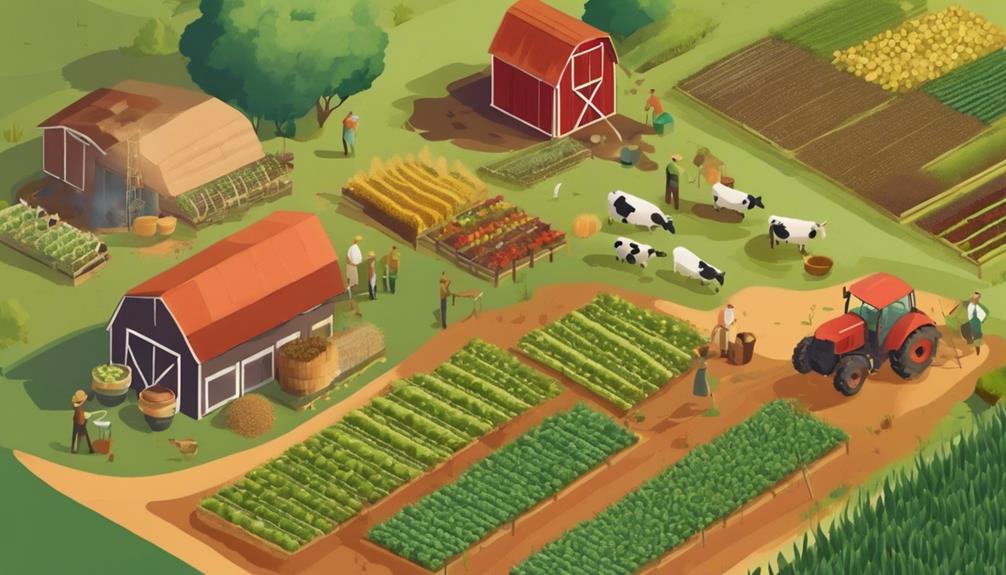Why Is Sustainable Agriculture Rooted in Farming Naturally?
In sustainable agriculture, the groundwork is natural farming, focusing on environmental care, soil vitality, biodiversity, and less chemical use for enduring success. The reliance on naturally derived methods ensures a resilient and thriving ecosystem that sustains yields and safeguards the environment effectively. Natural approaches like crop rotation and organic fertilizers foster healthier soil and better crop outcomes, showcasing the harmony between farming practices and nature's balance. Understanding this foundation is key to grasping the interconnectedness that drives sustainable agriculture's effectiveness and long-term benefits. Discover more about the significance of natural farming practices in creating a sustainable agricultural model.
Benefits of Organic Farming
Organic farming enhances soil fertility and biodiversity through natural methods, fostering sustainable agricultural practices that benefit both the environment and human health. One of the key benefits of organic farming is the improved yields it offers compared to conventional methods. Studies have shown that organic farming can lead to comparable or even higher yields than conventional farming in certain crops. This is achieved through practices such as crop rotation, companion planting, and the use of organic fertilizers, which help maintain soil health and productivity over the long term.
Environmental stewardship is another crucial aspect of organic farming. By avoiding synthetic pesticides and fertilizers, organic farmers help reduce the overall environmental impact of agriculture. Synthetic chemicals can leach into water sources, harm beneficial insects and wildlife, and degrade soil quality over time. In contrast, organic farming promotes biodiversity by creating habitats for beneficial insects, birds, and soil organisms. This, in turn, contributes to a more resilient and balanced ecosystem that can better withstand environmental challenges.
Soil Health and Biodiversity
Enhancing soil health and biodiversity is a fundamental aspect of sustainable agriculture practices, contributing to the resilience and productivity of farming systems. By focusing on improving yields and enhancing ecosystems through soil health and biodiversity, farmers can create a more sustainable and efficient agricultural system.
Improving soil health is essential for sustainable agriculture. Healthy soil is rich in organic matter, which provides essential nutrients to plants, leading to increased yields. Additionally, healthy soil retains water more effectively, reducing the need for irrigation and preventing soil erosion. This, in turn, enhances the overall productivity of the farming system.
Biodiversity plays a crucial role in sustainable agriculture by creating a balanced ecosystem. Diverse plant and animal species help control pests and diseases naturally, reducing the reliance on chemical pesticides. Furthermore, a diverse ecosystem improves soil structure and fertility, promoting plant growth and overall farm productivity.
Innovative farming practices such as cover cropping, crop rotation, and agroforestry can significantly enhance soil health and biodiversity. These practices not only improve soil structure and fertility but also provide habitats for beneficial organisms, further enriching the ecosystem.
Water Conservation Practices
Implementing efficient water conservation practices is crucial for sustainable agriculture, optimizing resource usage, and enhancing crop resilience. To achieve this, focusing on irrigation efficiency is paramount. By utilizing techniques such as drip irrigation or precision watering systems, farmers can reduce water wastage significantly while ensuring that crops receive adequate moisture for optimal growth. These methods not only conserve water but also help in maintaining soil health by preventing waterlogging and salinization.
Moreover, enhancing drought resistance in crops is vital for sustainable agriculture in water-stressed regions. Planting drought-resistant crop varieties and implementing practices like mulching can help plants withstand periods of water scarcity. Additionally, rainwater harvesting plays a key role in water conservation. Collecting rainwater in reservoirs or tanks during the rainy season provides farmers with an alternative water source for irrigation during dry periods, reducing their reliance on freshwater sources.
Furthermore, groundwater recharge strategies are essential for maintaining water availability in agricultural regions. Techniques such as constructing infiltration basins or using permeable materials can help replenish groundwater levels, ensuring a sustainable water supply for farming activities. By integrating these water conservation practices into agricultural systems, farmers can improve water use efficiency, enhance crop resilience to changing environmental conditions, and contribute to the long-term sustainability of agriculture.
Reduction of Chemical Inputs
To optimize agricultural sustainability further, you can explore innovative strategies to reduce chemical inputs while maintaining crop productivity and environmental health. Embracing natural pest control methods such as introducing beneficial insects or using trap crops can help minimize the need for synthetic pesticides. These methods not only reduce chemical residues in your produce but also foster a balanced ecosystem on your farm.
In addition to natural pest control, focusing on soil regeneration can also play a vital role in decreasing the reliance on chemical fertilizers. Practices like cover cropping, crop rotation, and composting enhance soil health, promoting beneficial microbial activity and nutrient availability. Healthy soils have improved water retention capacity, reducing the need for artificial irrigation and nutrient leaching.
Studies have shown that transitioning to reduced chemical inputs can lead to long-term economic benefits for farmers. By minimizing pesticide and fertilizer costs, you can improve your bottom line while offering consumers healthier and more environmentally friendly produce. Furthermore, adopting these practices can contribute to the overall sustainability of agriculture by conserving biodiversity and safeguarding natural resources for future generations.
Climate Change Mitigation
Reducing greenhouse gas emissions through sustainable agricultural practices is crucial for climate change mitigation efforts. Sustainable agriculture plays a vital role in sequestering carbon from the atmosphere, helping to offset the impacts of global warming. By implementing practices such as agroforestry, cover cropping, and reduced tillage, farmers can enhance carbon sequestration in soils, effectively removing carbon dioxide from the air and storing it in the ground.
In addition to carbon sequestration, integrating renewable energy sources into agricultural operations is a key strategy for mitigating climate change. Farmers can harness solar power through photovoltaic panels, utilize wind energy through turbines, or even explore bioenergy options such as biogas production from farm waste. By shifting towards renewable energy integration, farms can reduce their reliance on fossil fuels, lowering greenhouse gas emissions associated with traditional energy sources.
Data-driven approaches are essential for monitoring the impact of sustainable agricultural practices on climate change mitigation. Tracking changes in soil carbon levels, quantifying greenhouse gas emissions, and evaluating energy consumption patterns are crucial steps in assessing the effectiveness of these strategies. By embracing innovative solutions and adopting a proactive stance towards reducing emissions, the agricultural sector can significantly contribute to global efforts to combat climate change.
Support for Local Communities
Supporting local communities through sustainable agricultural initiatives fosters resilience and economic growth in rural areas. Community engagement plays a vital role in promoting food security and enhancing the well-being of individuals within these communities. By involving local residents in the agricultural process, sustainable farming practices not only provide access to fresh and nutritious produce but also create a sense of ownership and pride among community members.
In a study conducted by the Food and Agriculture Organization (FAO), it was found that community engagement in sustainable agriculture programs led to a significant increase in food security levels. By empowering local farmers to adopt environmentally friendly farming techniques, such as crop rotation and organic pest control, communities were able to improve their food production and reduce dependency on external food sources.
Furthermore, sustainable agriculture initiatives that focus on supporting local communities have been shown to strengthen social bonds and foster a sense of unity among residents. When individuals work together towards a common goal of sustainable food production, they build trust and cooperation within the community, leading to overall resilience in the face of challenges such as climate change or economic instability.
Economic Viability of Organic Farming

Enhancing the economic sustainability of organic farming requires a strategic integration of innovative practices and market-driven approaches. To ensure the economic viability of organic farming, consider the following:
- Understanding Market Demand: Conduct thorough market research to identify trends, consumer preferences, and potential niche markets for organic products. By aligning your production with market demand, you can optimize sales and pricing strategies to maximize profitability.
- Implementing Cost-Efficient Practices: Embrace sustainable farming techniques that not only benefit the environment but also enhance cost efficiency. For instance, adopting crop rotation, cover cropping, and integrated pest management can reduce input costs while maintaining soil fertility and crop health.
- Diversifying Revenue Streams: Explore avenues beyond traditional product sales to diversify revenue streams. This could involve value-added products, agritourism, or direct-to-consumer sales through farmers' markets or online platforms. By diversifying your income sources, you can mitigate market fluctuations and enhance the overall financial resilience of your organic farm.
Consumer Health and Safety
Prioritizing consumer health and safety is fundamental in the realm of organic farming to ensure the integrity of products and maintain trust with customers. When it comes to food quality, organic farming practices focus on producing nutrient-dense foods free from synthetic pesticides, hormones, and genetically modified organisms (GMOs). Studies have shown that organic fruits and vegetables contain higher levels of antioxidants and essential vitamins compared to conventionally grown produce, which can have a significant impact on consumer health.
In addition to food quality, organic farming also considers the environmental impact of agricultural practices on consumer health and safety. By promoting biodiversity, reducing soil erosion, and minimizing water pollution, organic farming contributes to a healthier ecosystem, which in turn benefits consumer health. Research indicates that organic farming methods help preserve water quality, decrease pesticide exposure, and support overall environmental sustainability.
Ultimately, the emphasis on consumer health and safety in organic farming not only ensures the delivery of high-quality products but also promotes a sustainable agricultural system that prioritizes the well-being of both consumers and the environment. By choosing organic products, consumers can have confidence in the food they consume, knowing that it's produced in a way that supports their health and the health of the planet.
Conclusion
In conclusion, sustainable agriculture is deeply rooted in farming naturally due to the multitude of benefits it offers.
From promoting soil health and biodiversity to conserving water and reducing chemical inputs, organic farming practices are essential for mitigating climate change and supporting local communities.
Additionally, the economic viability of organic farming and the focus on consumer health and safety further highlight the importance of embracing sustainable agricultural practices for a healthier, more resilient food system.
